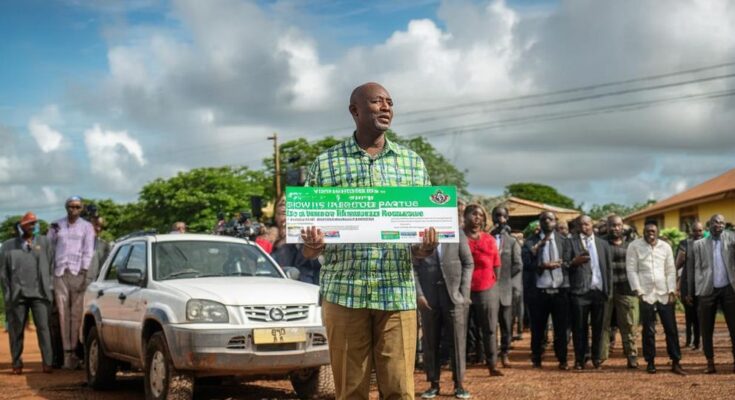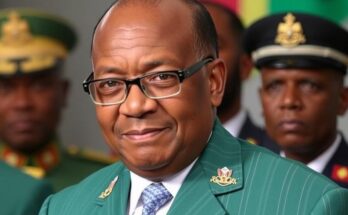Daniel Chapo of the Frelimo party has been declared the winner of Mozambique’s presidential election, receiving over 70 percent of the votes. Despite this victory, opposition candidate Venancio Mondlane alleges electoral fraud and calls for protests against Frelimo’s extended rule. Accusations of violence and misconduct in the lead-up to the election have raised tensions in the nation, further complicating the political climate.
The Frelimo party, Mozambique’s long-standing ruling political party, has announced that Daniel Chapo, its presidential candidate, has emerged victorious in the recent election, securing in excess of 70 percent of the total votes cast. This declaration by the National Election Commission (CNE) comes amidst escalating allegations of electoral fraud by opposition members. Chapo, backed by Frelimo, which has maintained power since the nation attained independence from Portugal in 1975, is set to officially assume the presidency in January 2024. Chapo’s main competitor, Venancio Mondlane, representing the independent viewpoint and aligned with the Podemos party, garnered just over 20 percent of the votes. Additionally, Ossufo Momade from the opposition party Renamo received more than five percent. Despite the results proclaiming a substantial margin for Frelimo, Mondlane has vociferously claimed malfeasance, asserting that he was the rightful victor and orchestrating calls for mass protests against what he perceives as an entrenched regime. Mondlane has taken to social media, urging followers to mobilize for a national demonstration aimed at dismantling Frelimo’s lengthy incumbency. He declared, “The time has come for the people to take power and say that we now want to change the history of this country.” Allegations of electoral misconduct have plagued Frelimo’s continued leadership, a charge the party has vehemently refuted. The election’s atmosphere has been notably charged following the violent killing of Elvino Dias, an advisor to Mondlane, which many, including Mondlane himself, implicate the security forces in. This incident has heightened tensions and prompted police to disperse protests with force. The European Union’s monitoring mission reported that some of their observers were barred from witnessing vote counts in specific locales and identified unwarranted alterations to results at several polling stations, further sowing doubt about the electoral integrity. As Mozambique prepares to navigate the ramifications of this contentious election and the ensuing unrest, it remains to be seen how the political landscape will evolve under Chapo’s leadership and in light of the allegations and protests spearheaded by opposition figures.
Mozambique has experienced significant political turbulence since gaining independence from Portuguese colonial rule in 1975. The Frelimo party has held power for nearly five decades, despite facing challenges, including a protracted civil war against the Renamo group. The recent election illustrates both Frelimo’s enduring dominance and the persistent strife within the political landscape, characterized by accusations of misconduct and violence against opposition supporters. As Mozambique advances, the societal implications of such a polarized electoral environment warrant close scrutiny.
The recent declaration of Daniel Chapo as the victor in Mozambique’s presidential election has ignited fierce allegations of electoral fraud, predominantly from the opposing factions. With Frelimo’s long hold on power now threatened by calls for reform and significant unrest, the country embarks on a critical juncture, facing the demands for accountability and change in governance. The shadows of violence and heightened tensions from the pre-election period pose substantial challenges for the incoming administration.
Original Source: www.aljazeera.com




